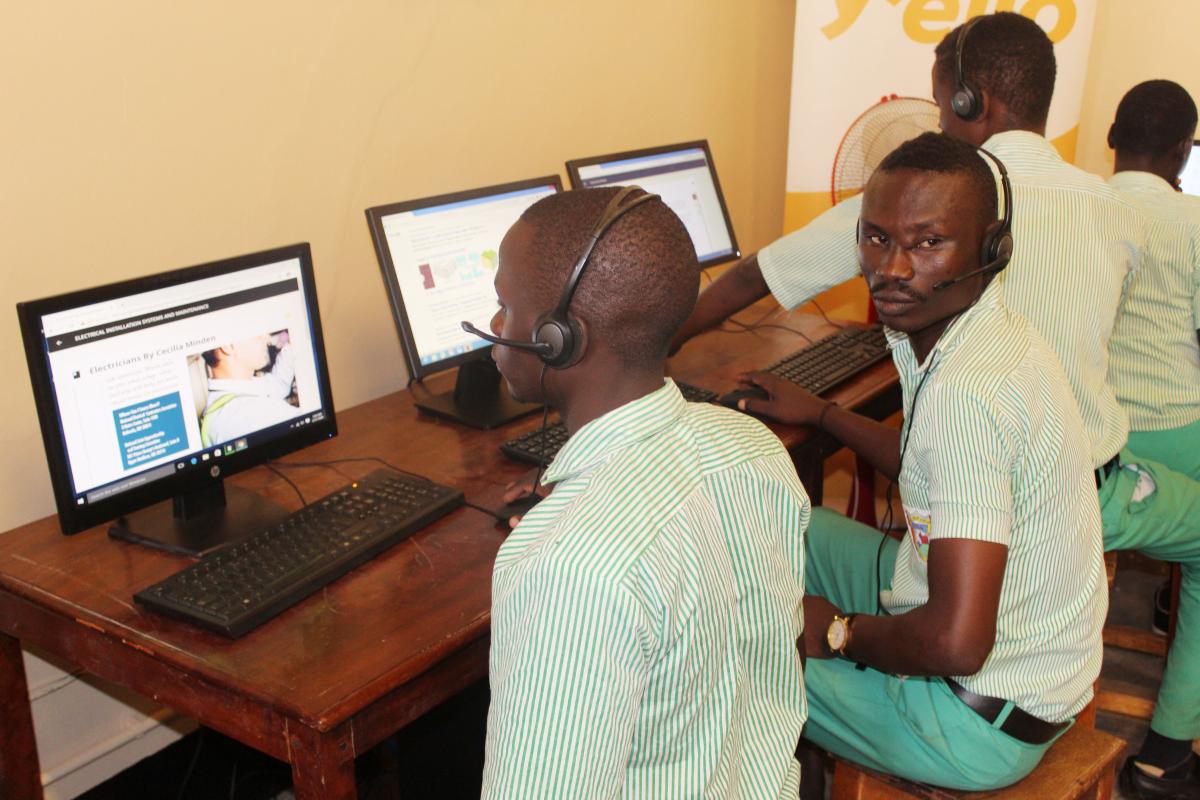Search
Viewing 2235 to 2250 of 3129 news
-
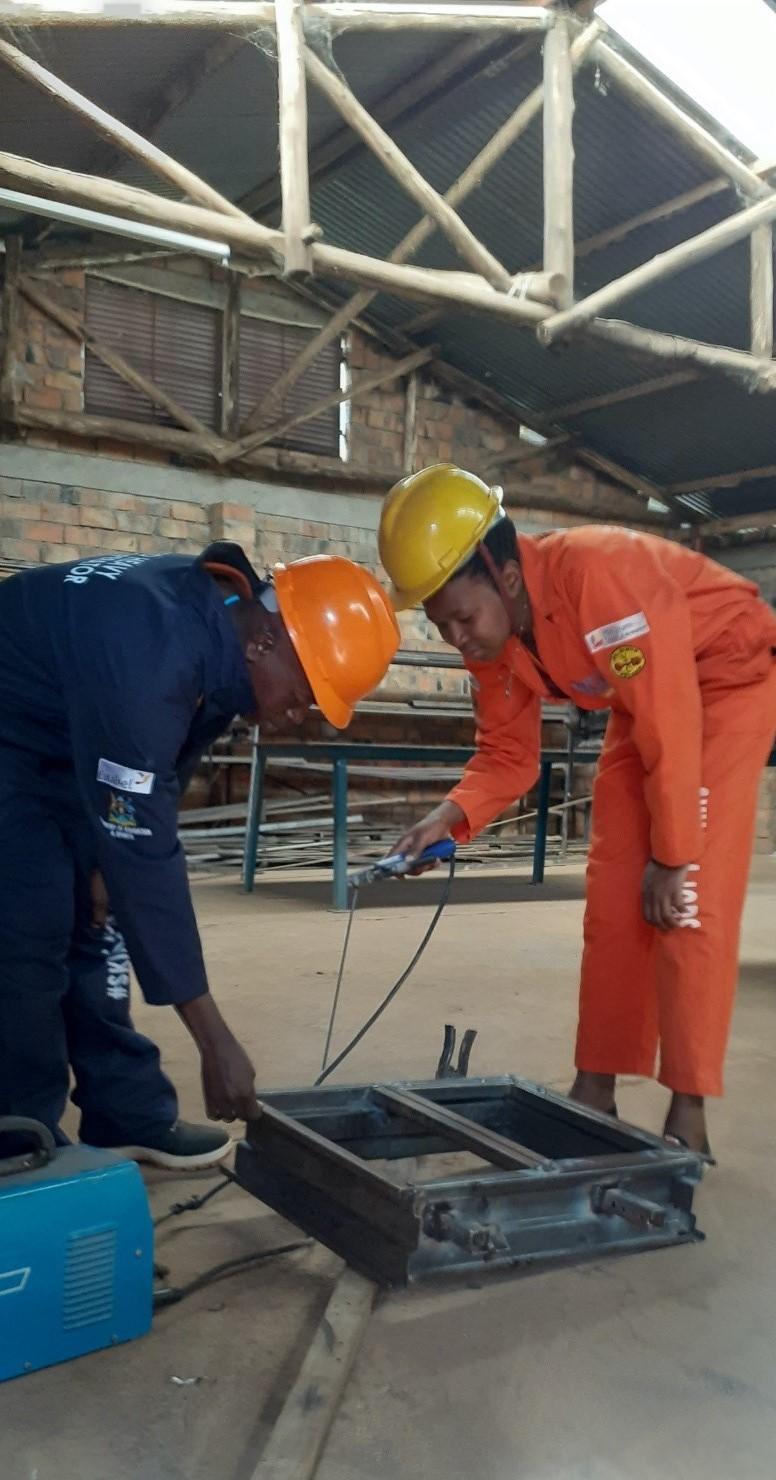
CHRIS AND YUDATA, TWO SKILLED WELDING EXPERTS LIVING THEIR DREAMS
Racheal AKELLO | 18/03/2020
At Bwendel Diary and Fabrication farm in Hoima, the duo Chris Byamukama, and Yudatha Agonzebwa, both graduates of St. Simon Peter's Vocational Training Institute in Hoima, are busy carrying out assigned tasks. Bwendel, 23, grew up in Kyangwali seeing many of his seniors operate machines at a nearby printery. To him this was magic. This affected his craving to become a teacher. “I always wanted to do something practical and sophisticated,” he says. His dream turned into reality when he chanced upon a radio announcement that was mobilizing for the enrolment of students in vocational training in Hoima. “When I came here, I wanted to become a motor vehicle mechanic but the course did not seem so “hi-tech” so I settled for welding because of the opportunity presented by the construction boom in the town and availability of machinery at the training institute,” he affirms.The story is not very different for Yudatha. The 21-year-old lady wanted to be either an Electrical engineer or a teacher. This decision became easier to make when the principal of St. Simon Peter's VTI Hoima, passionately gave a lecture on skilling at her local church after mass. “This motivational talk about ready employment particularly enticed me to quickly make a decision,” she says with a smile. Out of over 40 students who were on an internship, four interns were retained for employment at Bwendel and Yudatha was the only lady. The duo earn UGX 240,000 ($80) per month and Yudatha dedicatedly spends half the money to her young sister’s school fees. Chris is saving up to realise his dream of venturing into real estate (rentals) in the far future. He believes that rental space is easy to manage and he has the skill to do part of the work needed.Yudatha and Chris said that their biggest challenge is that they work 7 days a week and have no time to run personal errands. They, however, believe that the chance and opportunity to gain employment immediately after school has given them the needed exposure in the world of work.
-
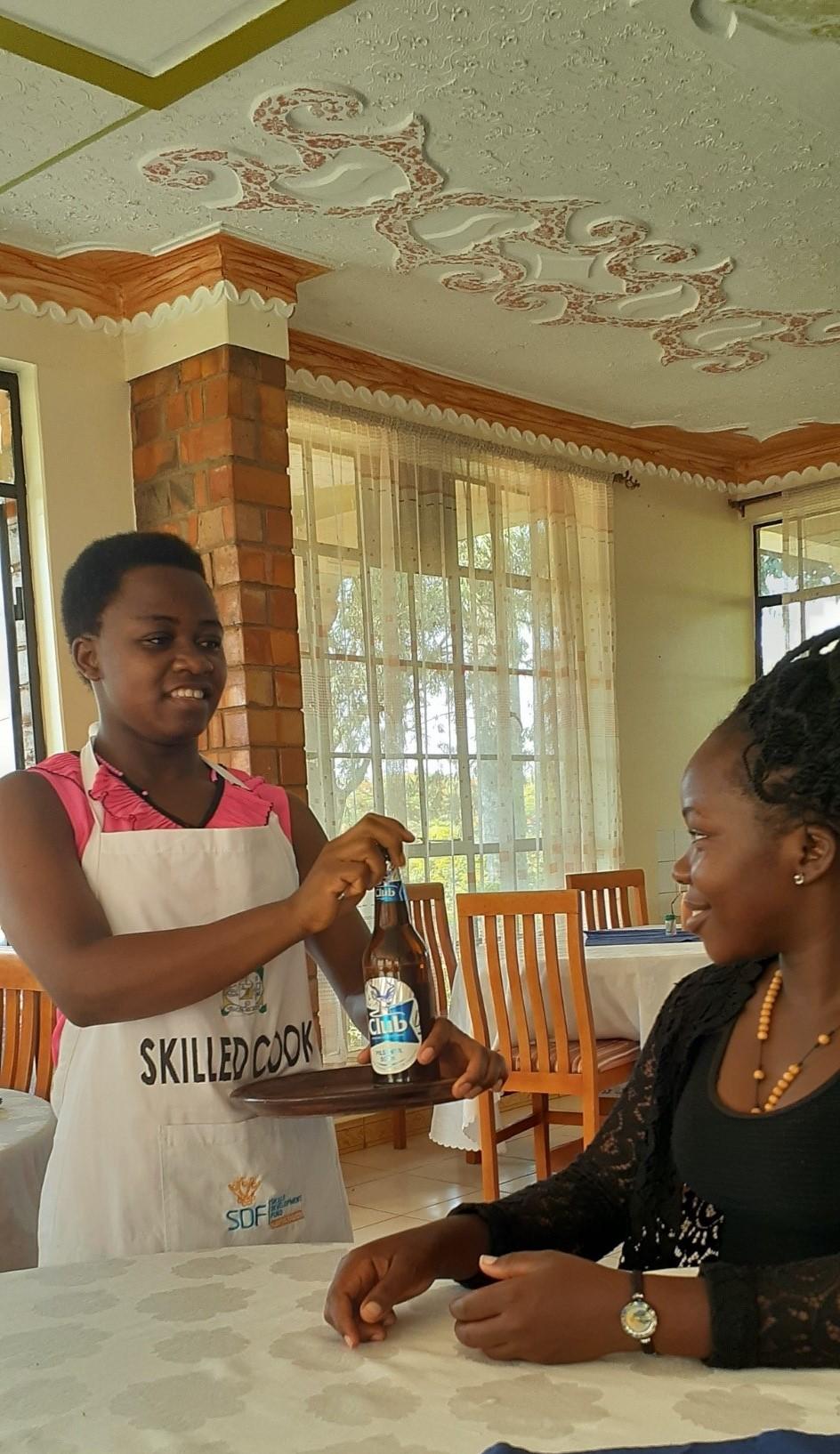
ELIZABETH MUKONYEZI, THE DOUBLE EMPLOYED CATERER.
Racheal AKELLO | 18/03/2020
Liz, as she prefers to be called, is 23 years old and is employed as a chef at Karibuni fast food restaurant and bar in Hoima. Two weeks before this interview, she had opened a roadside fast food business selling potato fries and roasted sausages. The agile chef from Kiombozi Hoima, earns UGX 150,000 (USD 35) per month as salary from her regular job at Karibuni Restaurant, but was also able to save some money for 6 months before she ventured into her own food business. “I only set up my roadside restaurant when I break off from work in the evening and I’m happy it supplements my income,” she says.Her dream of becoming a chef did not materialize on a silver platter. She had wanted to become a nurse but she did not pass her core science subjects to qualify for a nursing certificate course. Catering was her only available next option. She then counseled herself and enrolled. She says that she does not look back with regret because her choice is paying off well.She adds that at first it was boring to be a cook but she was motivated by the fact that the food business needs little capital to start, has a readymade market and a non-limited number of customers. “You see, everyone, whether poor or rich has to eat; you just have to position yourself well where your product can sell,” she affirms.Liz was exposed to an environment where girls are particularly skilled to compete favorably in a male-dominated world. She says that her roadside business has provided her with an environment to learn extra skills like budgeting and accounting for resources, managing sales and costs of production plus others related to running a business.Like most business people, Liz has a dream of growing bigger in business. The present challenge is that fact the tax collectors who collect market dues want all the little money she makes but she adds that she has endured knowing that tomorrow will be better. Millennium Business School, which is located in the Western region of Uganda in the district of Hoima, mainly specializes in Catering and Hospitality, Hairdressing and other female-dominated trades.
-
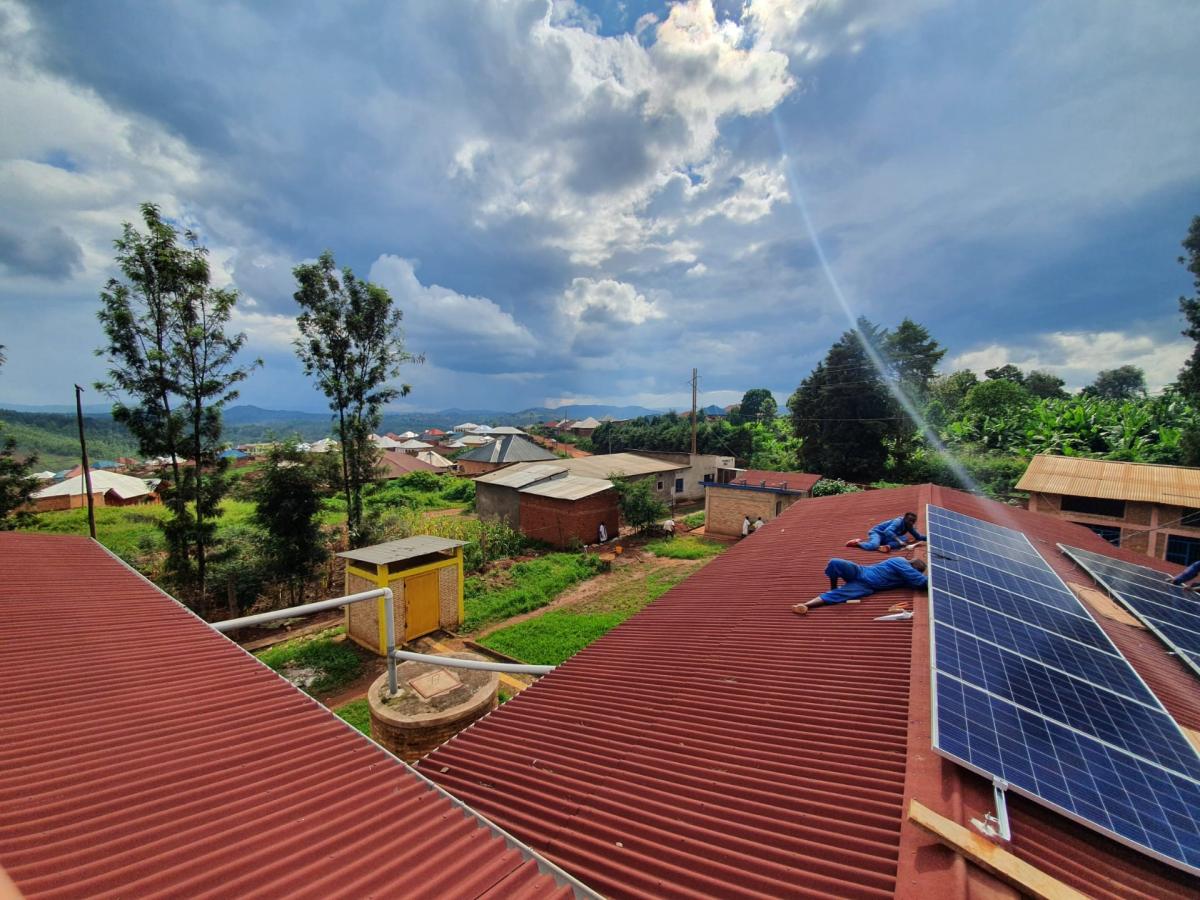
Formation pratique à la maintenance préventive des installations de back-up de l’énergie solaire au profit des Centres d’Enseignement des Métiers
Etienne RODENBACH | 10/03/2020
Dans le cadre du Projet ACFPT, Enabel, l’Agence Belge de Développement, appuie les Centres d’Enseignement des Métiers en investissant dans des infrastructures ciblées dont des installations de backup de l’énergie électrique et solaire pour améliorer les conditions d’accueil et permettre aux établissements d’offrir une formation de qualité dans de bonnes conditions. Les installations de back-up de l’énergie ont été installées dans 10 centres d’enseignement des métiers bénéficiaires du projet afin de garantir un service continu au niveau de l’administration du centre et des salles Multimédias que le Projet a mis en place afin de faciliter la mise en application progressive des apprentissages à travers les outils digitaux et réduire la fracture numérique de l’Enseignement professionnel et technique. La formation donnée par l’entreprise prestataire ENERSOL au cours du mois de février 2020 visait l’accès aux principes de base de fonctionnement du système et à la recherche de panne (aide à la lecture et compréhension du schéma du système, description des différents éléments, leur utilité, les différentes pannes possibles, les risques liés à l’électricité, la théorie sur les batteries, sur les panneaux photovoltaïques et sur les régulateurs et onduleurs) et la maintenance préventive (principe de base d’un calendrier de maintenance, intérêt et compréhension, l’utilisation d’un multimètre indispensable pour déceler une panne). La formation a suscité un vif intérêt des techniciens de maintenance des centres pour une technologie nouvelle mais aussi des directeurs des centres face aux enjeux de réduction des charges de l’énergie pour le centre. Enabel, contribue à l’élargissement des perspectives d’accès à une formation de qualité pour les jeunes burundais voulant accéder à un emploi de qualité et sécurise un environnement de travail optimal dans les centres prioritaires.
-
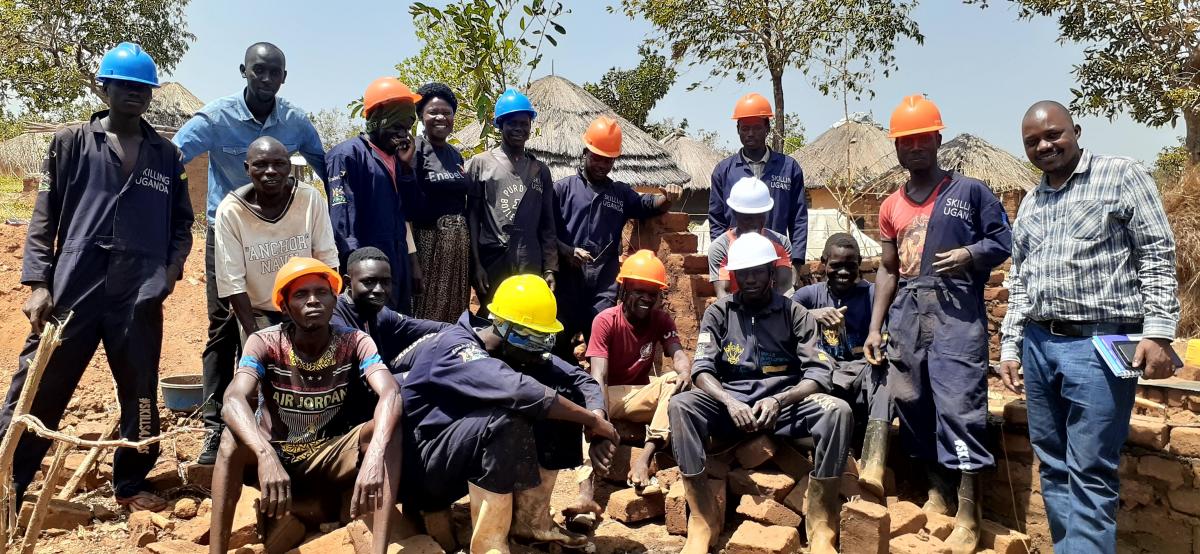
Skills training turns South Sudanese refugees to constructors
Ibrahim OGARAM | 10/03/2020
They are working tirelessly under the hot sun. On right hand side, some of them are mixing sand. Others are placing sand on the house foundation. On the left-hand side, a few are picking bricks from different locations. This is a group of young south Sudanese refugees and host communities’ members. Early, last year, many of them had no construction skills. They were staying in the settlements without any source of income. The same year, an opportunity to train was availed to them. They applied for the training in construction. After training for six months, the youth opened a construction group called Yoyo young talent builders and carpentry association in November,2019. They are among hundreds of young refugees and host communities who have been training under the skills development component under Enabel under the European Union emergency fund for northern Uganda. The project aims to equip the youth with skills so as to improve their livelihoods. According the group’s deputy chairperson, Francis Wani, a south Sudanese National, their group consists of 16 members. The 9 members are from the host communities and the other 7 from the refugee communities. After training, the group applied for a building grant with Peace wind Japan to construct houses for people with special needs. They received the contract. In January, they received shs 1m. Later in February, they received another payment of shs 1.5m. Then most recently, they received another payment of shs 2m. Out of these payments, Wani says, each member is able to get shs 120,000. They use the money to buy household items including clothes. Wani who apparently stays with his elderly parents uses the money to support his young siblings with scholastic materials. Wani says they are determined to build houses for fellow refugees in the settlement in Yoyo settlement in zone III. So far, they construct over three houses and handed it over to people with special needs. The group hopes to expand their construction group by buying more tools. They have expanded their group by incorporating other youth. Wani says, they are employing other youth as casual labourers. According to the local authorities, the youth have been able to provide descent houses for people with special. “So far, we have built five houses in the settlement. We work as a team. We are dedicated because this is our source of income.” Says wani The group has been registered with the local authorities at the settlement. Their dream is to open bank account and train more in financial management so as to improve their business ventures. They also hope to become a bigger company.
-
Enabel partners with Uganda’s leading telecommunications provider MTN to equip St. Daniel Comboni Polytechnic ICT Laboratory
William YEKA | 28/02/2020
Students of St. Daniel Comboni Polytechnic in the North Eastern district of Moroto are set to benefit from a fully furnished ICT lab courtesy of the MTN Foundation in partnership with the Belgian development agency, Enabel. The MTN Uganda Foundation which is the corporate social responsibility arm of MTN Uganda, in partnership with Enabel, a bilateral agency that implements and coordinates the international development policy of Belgium have extended support to vocational institutes through the provision of computers and fast internet connection.This is expected to partly contribute to the fulfillment of the aspirations of the 10-year BTVET strategic plan called “Skilling Uganda” and ultimately result in the equipping of youth with the skills needed for employment and job creation in order to eradicate poverty. The laboratory will also support and provide educational services to students from neighboring communities. MTN Uganda renovated and repainted the laboratory, donated 10 computers connected to high speed internet connectivity and a digital learning platform. Other beneficiaries include; St Simon Peter’s Vocational Training Center in Hoima and Amelo Technical Institute in Adjumani district which were refurbished and commissioned last year. Speaking at the commissioning of the laboratory at St. Daniel Comboni Polytechnic in Moroto, Mr. Wim Vanhelleputte, the Chief Executive Officer MTN Uganda said that: “The aim is to skill Ugandan youth for the 21st century job market by enabling them to access technical and vocational information online through open education resources for skills development.” Vanhelleputte further noted that the decision to support vocational institutions was based on the fact that vocational training was found to be an effective way of addressing unemployment, which is a major issue for the youth in Uganda today. The Ambassador of the Kingdom of Belgium to Uganda H.E Rudi Veestraeten noted that his country and Ireland have close to 5 years heavily invested in skills development through supporting the implementation of the skilling Uganda strategic plan. The laboratory, he said, will address some of the challenges that vocational institutes currently face.“Although ICT has been formally integrated into the Business, Technical, Vocational Education and Training curriculum, Vocational Institutes lack general computer equipment, trained ICT staff and ICT content and programmes,” he said. The Director for Higher Education at the Ministry of Education and Sports, Mr. Oceng Odok Robert lauded MTN Uganda and Enabel for supporting government initiatives through supporting the education sector. “As we are all aware, today, the role of ICTs in education cannot be under estimated. ICTs play a critical role of shaping the desirable 21st century work and life skills,” he said. Fr. Jude Kiggala, the Principal of the Institute said the laboratory will enable them to embrace modern technology to keep up with the ever-evolving trend so as to provide a workforce befitting the 21st century. “Instructors will use the lab to source information to better the quality of their trainings, understand the latest trends in their respective fields then align their trainings accordingly.” Fr. Kiggala said.
-
SYLVIA LACHORO THE FEMALE TRACTOR MECHANIC FROM NAPAK
Joseph BASOGA | 26/02/2020
From the little-known village of Lopida in Kangole town, Napak District, Karamoja region in Uganda, diminutive but resilient Sylvia Lachoro is has become an iconic mechanic.When you meet her on the dusty streets, her physical appearance cannot easily define the “lioness” spirit and ability to deliver. “I know this trade is generally reserved for men, but I joined to demystify this falsehood. Women too can be mechanics and I’m determined to be one of those very good ones,” she says with a shy smile.Her story begins from the time when her uncle Lote Michael (RIP) gave her a ride in a car that he had just repaired. She immediately admired him and she made up her mind to become a mechanic. “Uncle Lote is long gone, but I will never forget the impact he had on me after telling me that I could become anything I want,” she said. The dream to become a mechanic became reality when one of the graduates from Kangole technical institute came to her home with an application form requesting her to join the Skilling Uganda programme. He encouraged her to apply even when she had resorted to selling local brew with her mother. At the time, she had also already given birth to her first baby at the age of 17. She revealed that life as a single mother was tough and she needed survival skills. Lachoro enrolled for a certificate course in Mechanics and Moto-vehicle repair at Kangole master-craft garage. Lachoro confesses that she had to ignore a lot of teasing from the boys in the mechanics class. She clearly knows that this was to be the turning point in her life. In 2018, she completed the course and joined a road side garage in Napak owned to a one Hamid Kodet for her field practice. After for four months training she completed and was employed by the Lugazi Sugar corporation (SCOUL) as a trainee mechanic. She earns UGX 200,000 (approx. USD 70) a month and can afford the basics for her baby. “My life has changed a lot. I surely now know that skills can be very rewarding” she says with a smile. Sylvia lachoro is a true story of Karamojong girls with personal interest to learn skills in male dominated trades in order to escape extreme poverty.
-

Elevage dans la région de Koulikoro : vers la professionnalisation du métier d’éleveur à travers l’embouche.
Nènè TRAORE | 26/02/2020
Dans le cadre du projet d’Appui au renforcement de l’élevage et de l’économie pastorale au niveau de la Région de Koulikoro, un partenariat commercial sur la viande rouge a été mis en place entre Disnepal, une PME de distribution- négoce de produits alimentaires et une coopérative d’éleveurs à Fana. Au départ, des campagnes de sensibilisation ont eu lieu auprès des éleveurs afin qu’ils adhèrent à l’idée. Il s’agissait pour eux de mettre en embouche un certain nombre de bovins sur une durée minimum de 70 jours et maximum 90 jours. Au total, quinze éleveurs ont été mis en relation avec la PME pour cette phase pilote suivant des critères. C’est ainsi que le 14 février 2020 a eu lieu la livraison des animaux à la PME à Fana. Cette opération a consisté au pesage des animaux pour déterminer leur poids de sortie. A l’issue de ce processus, les éleveurs ont tiré des enseignements à savoir : le respect de l’itinéraire technique mis en place pouvant aboutir à des animaux de qualité qui répondent au cahier de charge de la PME ; la professionnalisation du métier d’éleveur qui constitue des avantages pour eux et enfin réussir à casser le mythe chez les éleveurs qui est désormais d’accepter de vendre les animaux au poids vif.
-

Active Teaching and Learning Experiences
Dorothy KYAMAZIMA | 26/02/2020
“Tell me and I forget, teach me and I remember, involve me and I learn.” Teachers are stepping away from the old chalk and talk method and now using Active Teaching and Learning for effective teaching in their classrooms.
-
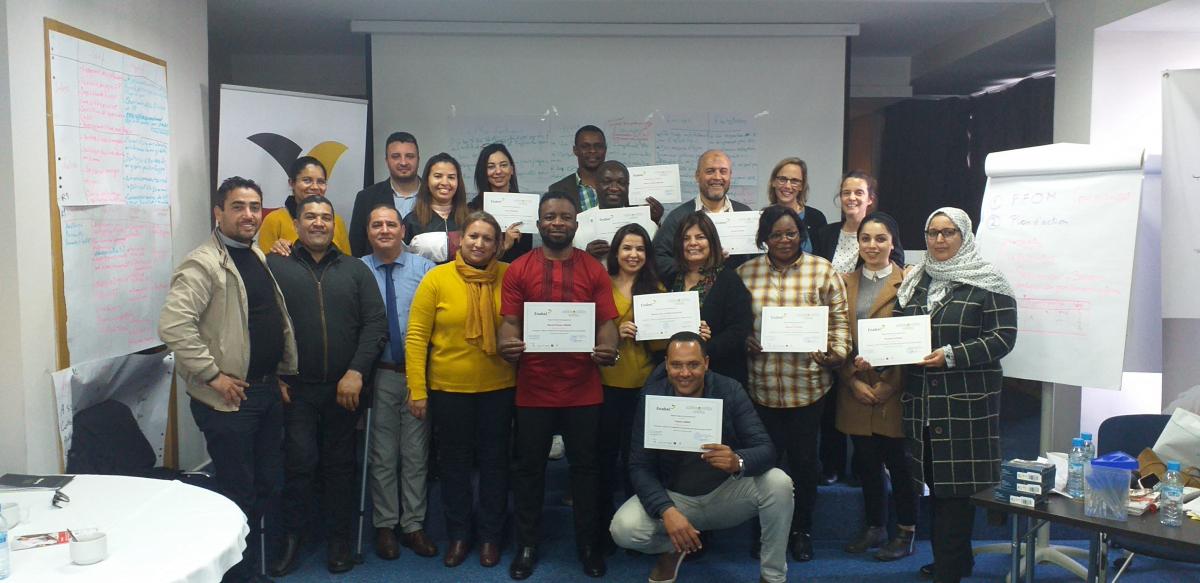
Les partenaires du projet Amuddu identifient des actions pour contribuer à l’équité de genre pour une meilleure intégration des personnes migrantes.
Saïd SAHLI | 24/02/2020
Déconstruire les stéréotypes envers les personnes migrantes pour mieux intégrer celles qui sont en situation de vulnérabilité dans le marché de l’emploi et l’auto-emploi était l’un des objectifs de la formation-action sur l’approche genre organisée par le projet Amuddu. Les partenaires du projet Amuddu ont approfondi leurs connaissances sur l’approche genre et ont élaboré un plan d’action opérationnel pour l’intégration de cette approche au sein du projet « Amuddu », lors de la formation-action organisée à Rabat du 4 au 7 février 2020. En outre, plusieurs points ont fait l’objet de discussions très constructives et qualitatives de la part des participant.e.s, d’ailleurs inscrits dans le programme de l’atelier, présentés par l’experte internationale en genre, Mme. Marcela de la Pena, tel que la déconstruction des préjugés, la compréhension des mécaniques d’exclusion et l’appréhension des couches de discrimination envers les personnes migrantes en situation de vulnérabilité, notamment à travers l’adoption d’une analyse de l’intersectionnalité des discriminations. Cette formation-action organisée par le projet Amuddu -mis en œuvre par Enabel en partenariat avec le Ministère délégué chargé des Marocains résidant à l’étranger, l’Entraide nationale et l’ANAPEC- pendant quatre jours, au profit des partenaires et des équipes du projet a été l’occasion d’interpeller les participant.e.s sur différentes thématiques interreliées, mettant le focus sur le lien entre le genre et la migration. « A contrario des formations générales sur le genre qui présentent plus des aspects liés aux violences contre les femmes et qui ne sont pas des moindres, cette formation a fait le focus sur la question de l’intégration économique des femmes migrantes et des inégalités à tenir en compte pour leur meilleure mobilisation puis intégration socio-économique » dixit un des participants. En effet, pendant ces quatre jours de travail participatif et de co-construction, les présent.e.s ont exploré, à travers des données factuelles et encadrées par l’experte internationale genre, le parcours de migration avec une attention particulière à la situation des femmes, parfois très rude, ainsi que les conditions de vie locales dans le pays hôte, qui font que cette cible soit vulnérable et plombée par plusieurs inégalités à la base. Les femmes migrantes peuvent être seules ou accompagnées par des enfants ou la famille, avec des niveaux de formation variés, confrontées seules à plusieurs écueils qui ne sont généralement pas pris en considération lors de son processus d’intégration économique. Au-delà des objectifs de la formation-action définis par le projet, notamment la vulgarisation des concepts liés au genre et des outils d’analyse des rapports et rôles sociaux entre l’homme et la femme, ainsi que l’élaboration d’un plan d’action opérationnel pour intégrer le genre dans le projet, il s’est agi également de partager des constats et des témoignages émouvants par les participant.es, qui ont certainement contribué à une prise de conscience. À l’issu de cette action d’apprentissage, toutes et tous les apprenant.e.s ont exprimé leur satisfaction quant à la qualité des données, concepts et outils présenté.es dans le moule d’une méthodologie interactive et audio-visuelle. Dite formation a été lancée dans le cadre d’une approche globale basée sur les droits humains, porté par Enabel visant l’autonomisation (empowerment) des femmes et la promotion de l’égalité des femmes et des hommes lors de l’exécution de ses programmes de développement. Dans ce sens, Enabel a élaboré une Stratégie genre qui couvre la période de 2019-2023, We for her[1], qui concerne toutes ses interventions. La nouvelle Stratégie genre 2019-2023 souligne qu’Enabel continuera à s’engager pour l’automatisation des femmes et pour la promotion de l’égalité entre les femmes et les hommes, le genre est ainsi inscrit dans l’ADN d’Enabel. Cette stratégie propose un travail à deux niveaux : d’une part, une intégration du genre à la politique de développement, aux programmes et projets (niveau opérationnel) et, d’autre part, le gender mainstreaming sur le plan organisationnel (niveau organisationnel). [1] ENABEL : Note relative à la stratégie genre 2019-2023. WE FOR HER - #weforher et Enabel : Stratégie genre 2019-2023. #WE FOR HER. Plan d’action 2019-2023. Actions en 2019.
-
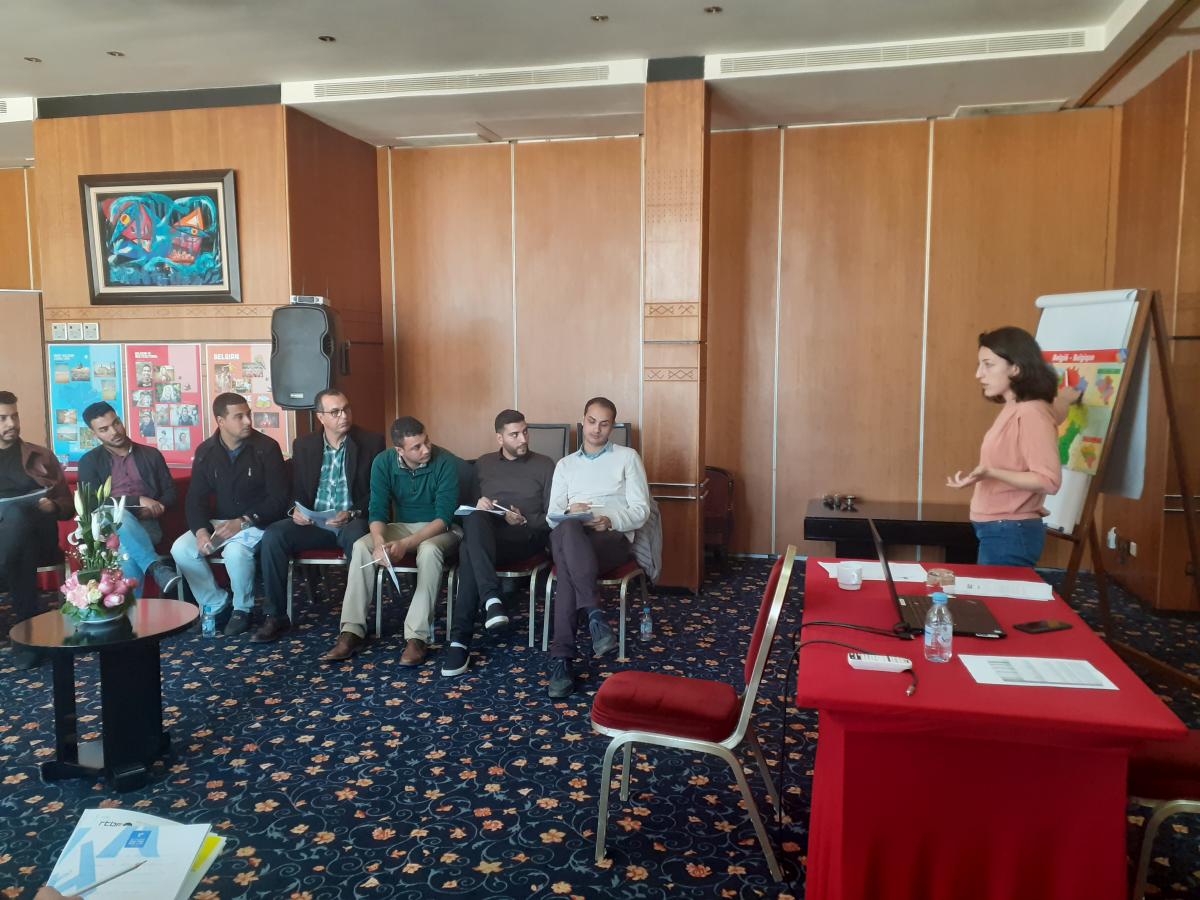
Scéances d'informations au profit de 120 jeunes
Meriem HILALI | 17/02/2020
Dix séances d'information ont été tenue du 04 au 14 février par l’Agence fédérale pour l'accueil des demandeurs d'asile (Fedasil) au profit des 120 jeunes demandeurs d'emploi dans 5 villes différentes au Maroc qui suivent la formation JAVA depuis le mois de novembre 2019 dans le cadre du projet PALIM, cette intervention vise à répondre aux pénuries de main-d'œuvre à travers des modèles de migration innovants. Le projet pilote est mis en œuvre par Enabel, Agence belge de développement, en partenariat avec l’Agence nationale marocaine de promotion de l'emploi et des compétences (ANAPEC), le Service flamand pour l’emploi et la formation professionnelle (VDAB), le Réseau flamand d’entreprises (VOKA), la Confédération Générale des Entreprises du Maroc (CGEM), la Fédération belge d’entreprises technologiques (AGORIA) et la Fédération marocaine des Technologies de l'Information, des Télécommunications et de l'Offshoring (APEBI). Une trentaine d’entre eux seront sélectionnés pour travailler en Flandre, L’objectif est de les orienter sur les éléments légaux et culturels relatifs à la mobilité internationale vers la Belgique et plus particulièrement la Flandre.
-
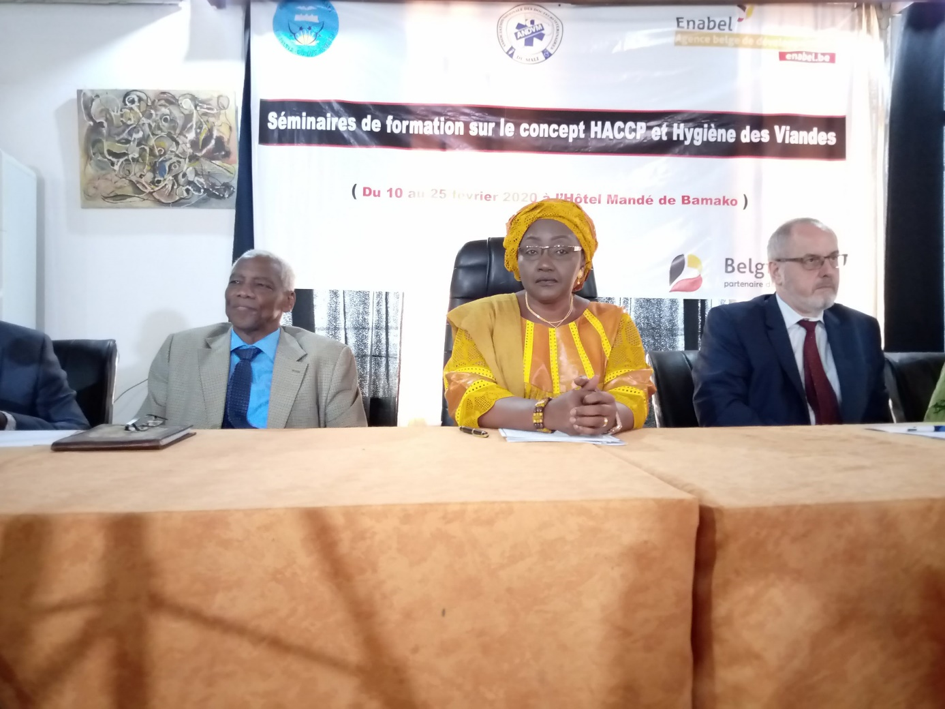
Enabel renforce les connaissances des docteurs vétérinaires en hygiène des viandes et en système d’inspection dans les abattoirs
Nènè TRAORE | 17/02/2020
Enabel renforce les connaissances des docteurs vétérinaires en hygiène des viandes et en système d’inspection dans les abattoirs. Bien qu’il existe une réglementation et une implication de l’État malien dans la promotion de la sécurité sanitaire des aliments, force est de constater que la majorité des professionnels de la viande, vétérinaires et autres spécialistes de production animale ne maîtrisent pas l’analyse des risques comme méthode objective et justifiable pour évaluer et gérer ces risques sanitaires. C’est dans cette optique que le projet de Renforcement des capacités des institutions et des acteurs de la société civile au niveau de la région de Koulikoro et du niveau central (IRC) a organisé, du 11 au 22 février 2020 à Bamako, un séminaire de formation à l’intention d’une vingtaine de docteurs vétérinaires sur l’hygiène des viandes et la mise en application d’un système d’inspection dans les abattoirs. La cérémonie d’ouverture a été présidée par madame Kané Rokia Maguiraga,, ministre de l’élevage et de la pêche du Mali, en présence de monsieur Adrien Théâtre, ambassadeur de la Belgique. Pour la ministre, cette formation aura un impact positif pour les vétérinaires maliens, puisqu’elle permettra de les mettre au même niveau en santé publique vétérinaire et d’organiser la structure de production des abattoirs. D’autre part, les consommateurs auront des produits de qualité qui respectent les règles d’hygiène. La formation a été animée par Dr Boubacar Sidibé, expert international en matière de sécurité sanitaire des aliments d’origine animale. Les thématiques abordées au cours des deux semaines étaient : les dangers dans les aliments, les maladies liées à la viande, les zoonoses transmissibles à l’abattoir, les principes généraux d’hygiène alimentaire, la gestion parasitaire intégrée, les systèmes nationaux de contrôle alimentaire, les principes de l’HACCP (Hazard Analysis and Critical Control Points) et la mise en pratique en abattoir, etc.
-
Promouvoir la Santé Sexuelle et Reproductive et l’accès à l’information sanitaire : Un nouveau défi pour Enabel au Bénin
Reece-hermine ADANWENON | 13/02/2020
Les communes d’Allada et d’Aplahoué ont respectivement accueilli, le mardi 11 et mercredi 12 février 2020 les cérémonies marquant le lancement officiel du Programme d’Appui à la Santé Sexuelle et Reproductive et à l’Information Sanitaire (P@SRIS). Durant ces deux jours, il s’est agi de : • informer et sensibiliser les populations sur le but, les objectifs, les stratégies, les activités et les résultats attendus du P@SRIS • orienter les décideurs et acteurs clés de SSR/DSRAJ des zones d’interventions sur le contenu du programme ainsi que sur les rôles et responsabilités des acteurs clés dans sa mise en œuvre efficace •susciter l’adhésion et l’engagement des autorités, des personnes ressources et des bénéficiaires zones d’interventions concernées. A Allada, comme à Aplahoué plusieurs voix se sont succédées pour saluer cette initiative de Enabel au Bénin à travers le P@SRIS, qui contribuera à améliorer la situation des adolescents et jeunes en matière de santé sexuelle et reproductive. Il favorisera une maternité sans risque et organisera la lutte contre les violences sexuelles et basées sur le genre. Le P@SRIS renforcera aussi la qualité de l’information sanitaire et sa mise à disposition auprès des acteurs du système de santé pour une prise de décision informée et en temps réel. Au cours des cérémonies, les lauréats au concours Mes droits j'en parle ont été primés . Provenant des collèges d’Enseignement Général CEG ou Collèges privés, les lauréats âgés de 12 à 20 ans ont été présentés par leurs établissements respectifs pour concourir dans les différentes catégories de leur choix à savoir : Sketch/Théâtre, Art oratoire (Poésie/Discours/Essai) et Art plastique (Dessin/Peinture). A l’issue du concours, 19 prix d’un montant total d’environ 3.500.000 Fcfa ont été décernés aux lauréats dans les 03 différentes catégories. Le CEG Bertrand Dagnon de Ouidah et le Collège le Pivot sont repartis avec les premiers prix dans la catégorie Théâtre. Dans la catégorie Art oratoire, le CEG1 De Lalo et le CEG Bertrand Dagnon de Ouidah ont remporté les premiers prix et dans la catégorie Art Plastique les premiers prix sont revenus au CEG de Godomey et au Collègue Catholique d'Azovè.
-
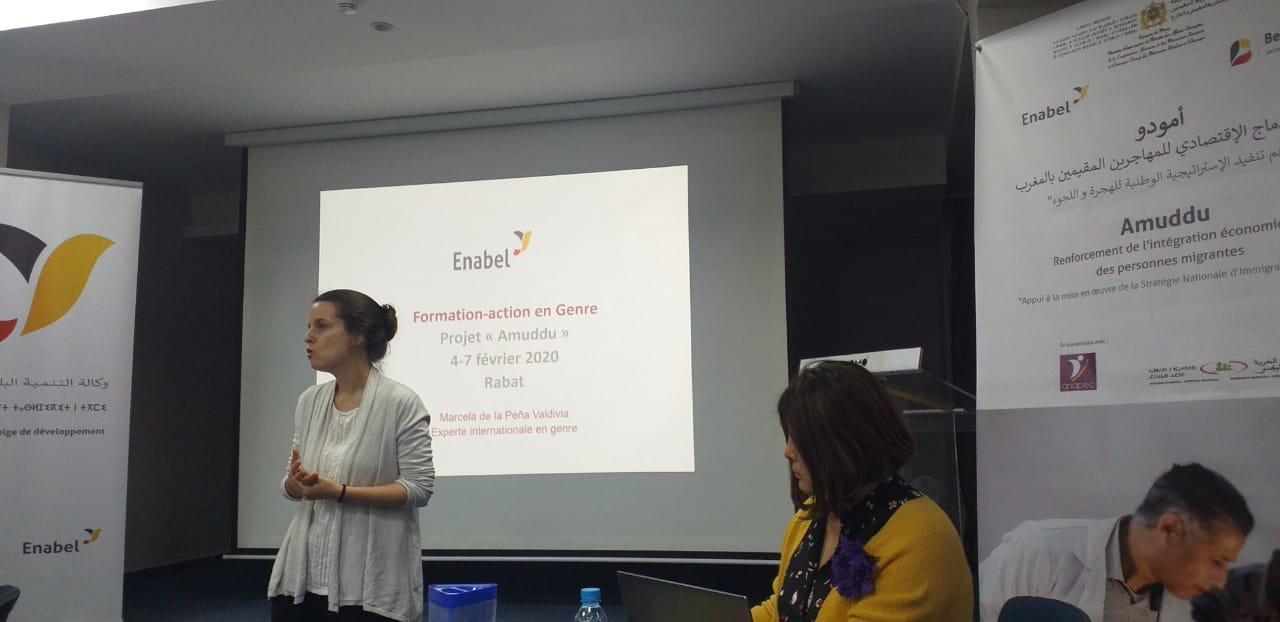
Une formation action en genre
Meriem HILALI | 13/02/2020
Du 4 au 7 février 2020, formation action en genre au profit des partenaires institutionnels et de l'équipe du projet d'Appui à la mise en œuvre de la stratégie nationale d'immigration et d'asile, et ce pour l'élaboration d'un plan d'action opérationnel pour l'intégration de l'approche genre.
-
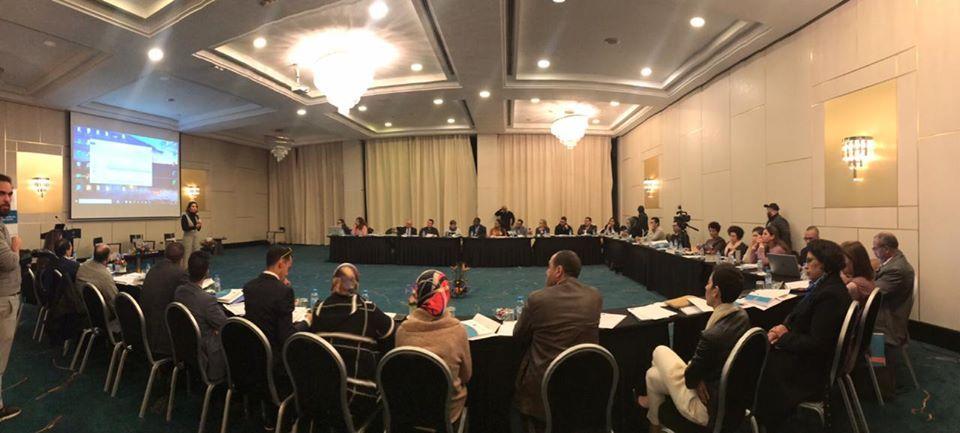
Un atelier d’échanges sur les thèmes du droit d’asile, de la migration et du travail clinique
Meriem HILALI | 13/02/2020
Financé par le fonds fiduciaire d’urgence de la Délégation de l'Union Européenne et mis en œuvre par Enabel au Maroc en partenariat avec le Ministère de la Justice et le Ministère Délégué Chargé des MRE et des Affaires de la Migration Le projet Empowerment juridique des personnes migrantes a organisé mercredi 5 février 2020 à Casablanca, un atelier d’échanges sur les thèmes du droit d’asile, de la migration et du travail clinique. Ciblant plus spécifiquement les thématiques du droit d’asile, de la migration et du travail clinique, cette rencontre permettra de renforcer les outils de travail des professeurs, doctorants et étudiants impliqués dans les cliniques juridiques.
-

Renforcement des capacités des collectivités : Enabel s’implique
Nènè TRAORE | 12/02/2020
Une trentaine d’agents de la mairie de Koulikoro et leurs partenaires locaux à savoir des membres des organisations communautaires ont participé du 30 au 31 janvier 2020 à un atelier de formation en élaboration des outils de planification du développement social, économique et culturel et du programme d’investissement.Cette formation avait comme objectif de renforcer les capacités individuelles des principaux acteurs du développement communal sur les outils de planification locale. L’élaboration des outils de planification représente l’une des préoccupations majeures de collectivités décentralisées au Mali pour la seule raison que ces outils sont la colonne vertébrale des activités de réalisation et d’investissement pour ces collectivités. L’élaboration de ces outils de planification constitue un problème presqu’insoluble pour les collectivités à cause des procédures et démarches administratives et financières à suivre.C’est dans le souci de trouver une solution définitive à tous ces contrastes qu’une session de renforcement de capacités des agents de collectivités, mais aussi des représentants des quartiers et des représentants des services techniques de l’état au niveau local (Santé , élevage) a été faite suite à la requête formulée par la marie dans ce sens. Le maire de Koulikoro confirme l’importance de cette formation : « La commune urbaine de Koulikoro n’a pas à son sein de compétence requise pour élaborer certains documents de planification utiles pour son développement. Cette session de formation vient à point nommé, car elle vise essentiellement à appuyer le développement institutionnel et le renforcement organisationnel des acteurs et de façon spécifique à doter la commune urbaine d’un vivier de ressource humaines compétentes à même d’impulser une dynamique de changement institutionnel et organisationnel ».
